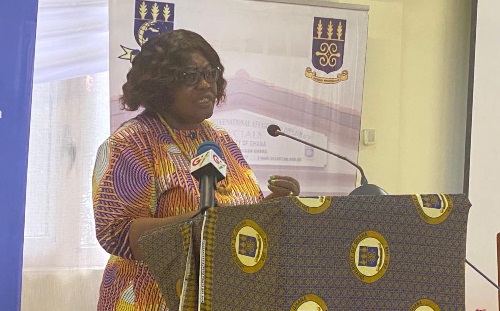
Adopt local research to solve conflicts in Africa - Prof. Mensa-Bonsu
A Supreme Court Judge, Justice Professor Henrietta J.A.N. Mensa-Bonsu, has stressed the need for stakeholders to use locally produced research findings to help build sustainable peace in Africa.
She explained that without research to situate the contextual understanding of a problem, it will be difficult to apply foreign solutions.
“Role of research on particular communities, and assessment methodologies to provide indicators for measuring success etc. are very important as context specific issues may be used to affect the operational design of any programmes before, during and after initiation,” she noted.
Prof. Mensa-Bonsu was speaking at a conference organised by the Merian Institute for Advanced Studies in Africa (MIASA), held at the Legon Centre for International Affairs and Diplomacy (LECIAD) on November 27, 2023.
The conference, which was held on the theme: “Sustainable Regional Peacebuilding in Africa: Practices and Disconnects Conference of the Interdisciplinary Fellow Group “Sustainable regional peacebuilding” brought together different stakeholders to discuss peace building processes and initiatives in Africa.
MIASA
The MIASA is an institute under the College of Humanities, University of Ghana. MIASA, which serves as a platform for German-African research collaboration in the social sciences and humanities aims at making African thinking increasingly relevant in academic debates.
MIASA's research programme explores the issue of sustainable governance in an interdisciplinary perspective, focusing on three thematic area: democratic governance; peace and conflict, and sustainable transformations.
Peace Building
Prof. Mensa-Bonsu said in Africa, international actors often import research conducted in other areas, and put the findings to use when such information is required.
However, she noted, the African context is so different from the societies whose research is thought relevant enough to rely on, pointing out that the absence of homegrown research can be a big minus in sustainable peacebuilding.
For her, international and regional responses need to be informed by analyses that take these regional dynamics into account, and political and programmatic responses need to be designed to influence and leverage these complex conflict systems.
“Locally generated research by local scholars would enable the flexibility in design and implementation of programmes that Cedric de Coning characterizes as ‘adaptive peacebuilding,’” Prof. Mensa-Bonsu explained.
She explained that “People who operate in, and understand the social and political context are more likely to produce assessments that help to modify existing programmes to make them more useful as shifts in the terrain occur, than those who observe with the eye of a foreigner.”
She added, “Therefore leaning on locally-generated research would foster a deeper understanding of the terrain and make a foreign peacebuilder more sensitive to the nuances inherent in societal arrangements.”
Prof. Mensa-Bonsu stressed that peace is a necessary condition for development, and that peacebuilding is a critical activity to secure that needed space for development.
That, she noted, there is therefore a symbiotic relationship between peace and development, urging all stakeholders to play their roles as expected to ensure sustainable peace building in the African region.
She noted that peace building is organic and thus required constant efforts to keep it growing, pointing failure to build it can affect its growth and sustainability.
The Supreme Court Judge also raised concerns that issues such as lack of funding, climate change, human resource deficits, including inadequate skilled human resource in both host country and international peacebuilding community, could all affect peace building processes.
She has, therefore called on political actors, civil society, diaspora, religious and traditional authorities, and the international community to contribute to sustainable peace building initiatives and processes in Africa.
Purpose of conference
In their welcoming address, Dr. Grace Diabah, MIASA Director, Ghana, and Dr. Susann Baller, MIASA Director, Germany, said the conference “will provide opportunity to present and discuss research results as well as emerging issues together with international experts from across the African continent, Germany, and north America.”
They added that MIASA “is committed to making African thinking increasingly relevant in the global academic world, and it encourages the intellectual exchange across existing boundaries—between disciplines, between different academic cultures, countries and continents.”
In addition, Dr. Diabah and Dr. Baller indicated, “This conference contributes to these objectives, as the topic is very timely, and the conference programme covers both insights into peace building practices as well as practitioners’ experiences and perspectives.”
